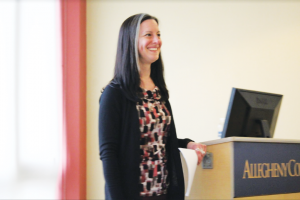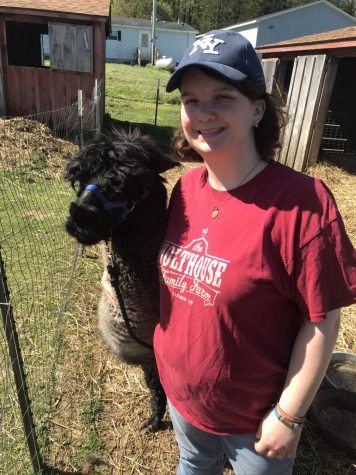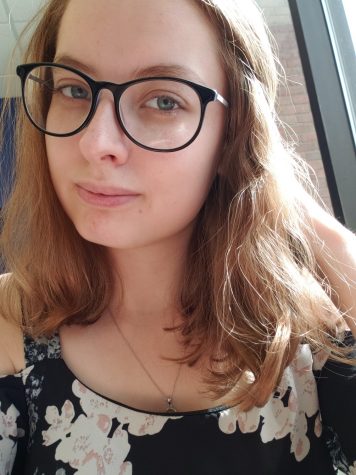From fiction to reality
Lewis talks Hugo, podcasts, pains of real human life
Another day, another destiny.
Telling the story of how she decided to become a podcaster and the fears and uncertainties that came with that, Brianna Lewis, associate professor of French, concluded the four-part Karl W. Weiss ’87 Faculty Lecture series of the spring semester with her lecture “Podcasting Les Misérables: How I Learned to Stop Worrying and Try Public Humanities” on Wednesday, April 10, in the Henderson Campus Center.
Lewis described to her audience how the title of her lecture came from the 1964 movie “Dr. Strangelove,” saying that starting the podcast project with no idea what she was doing felt like riding a bomb, as one of the characters does in the movie.
“Starting this project felt a bit like I was riding the instrument of my own destruction into academic oblivion,” Lewis said.

Associate Professor of French Briana Lewis describes her fears of entering into the world of creating a podcast during a lecture on Wednesday, April 10, 2019.
Lewis was introduced by Associate Professor of Music James Niblock, who told attendees about Lewis’s research background surrounding “Les Misérables.”
“Her research focuses on the works of Victor Hugo most significantly, ‘Les Misérables,’ his 1862 novel, some of you may have heard of it,” Niblock said.
Lewis focused her lecture around her podcast “The Les Misérables Reading Companion,” which she began during her sabbatical in November 2017.
Lewis described three main fears she experienced when starting the podcast: Whether the “big scholar” who would listen to her podcast would approve, whether people would listen to it at all and what if it wasn’t actually good?
“That would be embarrassing if people didn’t listen to it, but at the same time (I thought) what if they did?” Lewis said. “But I didn’t get into this to be famous. Some people like that, I hear it’s a thing people pursue, but not me.”
Lewis described how “Les Misérables” “seemed urgent” to her when she began to think about starting her podcast because the events in the book reminded her of events in today’s world.
After reading the audience a quote from the preface of the book, Lewis recounted Hugo’s tale.
“He then went on to tell a very long story,” Lewis said. “He told a story of this social damnation, of this hell in the midst of civilization … and it’s a story of economic inequality, a story of an unfair justice system, of human beings being made into commodities. It’s a story of prejudice winning out over compassion, and the suffering that results from that. It’s a story about the role that religion can play, narrowing social divisions. And it’s about the inevitable result of all that stuff.”
A section of Lewis’s slideshow was dedicated to pictures of today’s current events, and while she described the inequalities of “Les Misérables,” she pulled up a picture of recent events that connected to each inequality she mentioned.
Lewis said “it occurred” to her that in today’s current society, “Les Misérables” had a use, because as she described it, arguing does not change people’s minds but “often storytelling can.”
Lewis then described how she began to think of what her podcast could be, deciding it was for the readers of the book, mostly, and it would be a “read along” with Lewis’s voice reading through and explaining sections of the book.
Lewis recalled some technical problems she experienced as she began her podcast, playing an outtake reel of some of her recordings for the audience.
“The first step I knew how to do, I knew how to write,” Lewis said. “Well, I sort of knew how to write. I had to relearn how to write.”
Continuing through her slideshow, Lewis pulled up a graph showing the number of people who listened to her podcast, with graphs showing daily downloads, monthly downloads and downloads per podcast episode, with about 120 to 150 people following her series.
“Those aren’t huge numbers for a podcast … but these are pretty good numbers for academic work,” Lewis said.
Lewis added one more fear to her list: the fear of responses on the internet, though Lewis said most of the responses she received were positive.
“I’m blown away by the courage you’ve shown just facing these fears,” said Jim Fitch, director of career education.“What kind of feedback have you gotten from your mentors or other professors?”
Lewis said she has not quite had the courage to tell them about her podcast yet, because the biggest fear she had throughout her whole process of creating the podcast was the fear of how people she knew were going to react.
“I think this is really at the heart of why this is an important conversation,” Lewis said. “In the end, first of all, I had to trust myself. I had to say ‘this intuition that I have, that this is a good and important thing to do, I have to follow that intuition.’ I had to believe that talking about this book in public was important … I had to believe that literature matters. Because why would I put all this energy into it if it doesn’t?”

Sara Holthouse is a senior from Panama, NY. This is her third year/final semester on staff, where she has previously served as news editor for the past...

Emily Rice is a senior from Orlando, Florida. She is a Psychology major with an education studies minor. This is her third year on staff as a photographer....








